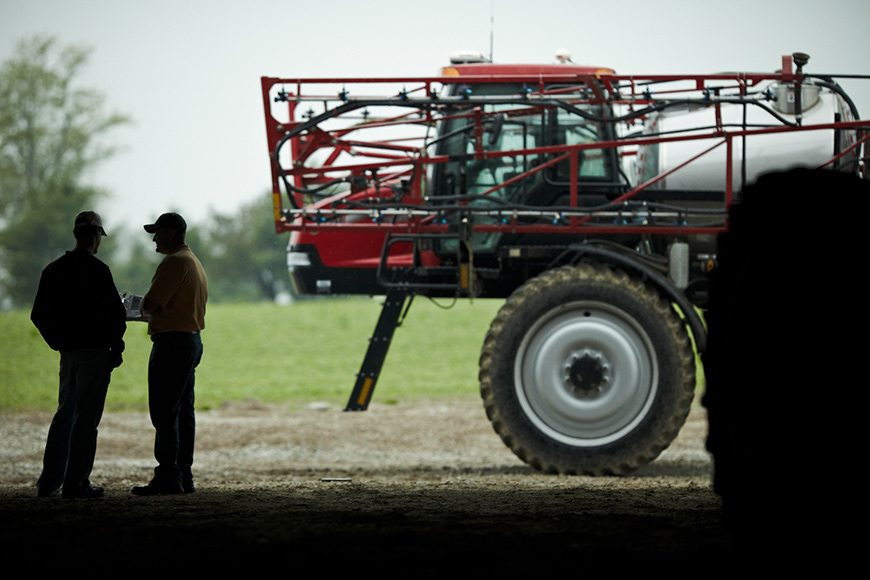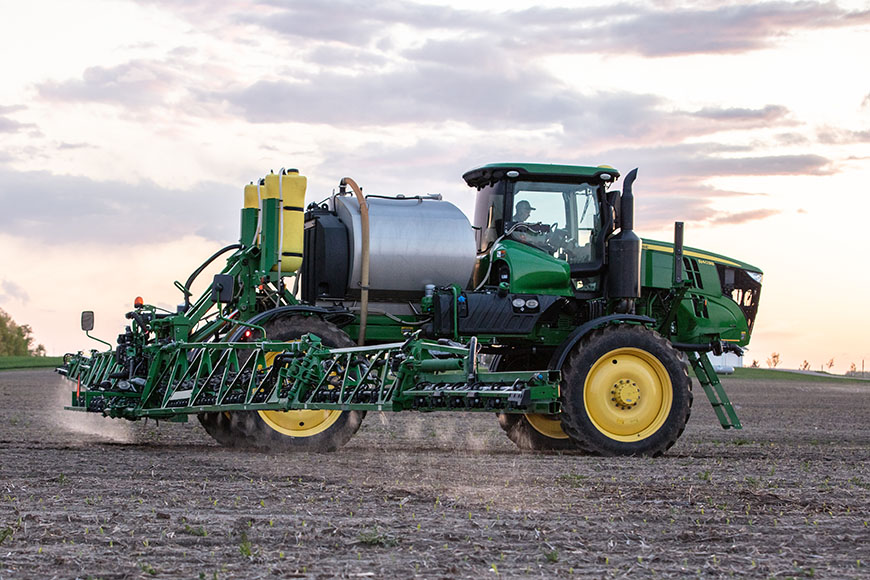Plan Now to Mitigate 2019’s Weeds In Your Fields

Don’t let 2019 weed challenges haunt you in 2020. Abundant moisture last spring and in early summer meant that weed populations flourished and adequate control was difficult. So what can be done at this point to make sure 2019’s weed pressures don’t cause problems next spring? Plenty. And here’s where to start.
Once you've taken time to think through these questions, you can start mapping out a plan. For example, if you didn’t get a full rate preemergence herbicide applied to your fields because of environmental challenges, you probably relied on a postemergence application to control weeds which is more difficult to do, especially when weeds are tall. This scenario can also lead to early season weed competition reducing yield potential. On the other hand, maybe you can attribute weed escapes in your field to unfavorable conditions at the time of spraying. That scenario may be harder to control, but there may be steps you can take to ensure you’re making the most of your spray applications. That means using the right spray nozzle for the herbicide mode of action being applied, adjusting gallons per acre and adding an adjuvant to help control drift and to improve herbicide deposition into the plant’s canopy.
Starting weed management with a fall burndown plus residual herbicide can give you extra insurance if unfavorable field conditions in the spring make weed control difficult, as many experienced this year. In addition, weedy fields can harbor overwintering insects which could increase pest pressures in fields next spring, making it all the more important to be proactive in making your plan.
New traits that confer resistance to 2,4-D and dicamba are an option, but these aren’t silver-bullet solutions to weed control. These new technologies need to be part of a season-long management practice, which includes multiple mode-of-action preemergence and residual herbicides. Not every herbicide is labeled to control every weed, which is why proper weed identification is critical to effective management.
In addition to the right herbicides, you should consider adding appropriate adjuvants to improve the performance of spray applications. Adjuvants help get more active ingredient to their intended targets, especially in tough environmental conditions like we saw this season. A water conditioner like Class Act® NG®, crop oil like Superb® HC or drift and deposition agent like StrikeLock® may be just what your herbicide tank mix needs to achieve the weed control that you expect. Be sure to follow the label of your preferred herbicide to understand adjuvant tank mixing restrictions and instructions.
Now is the time to build your weed management strategy. Work with your locally owned and operated WinField United retailer to find the best products for your most troublesome weeds and come up with a contingency plan for weed management in case conditions make it difficult to get adequate control next season.
1. USDA Farm Service Agency news release. August 12, 2019.
All photos are either the property of WinField United or used with permission.
© 2019 WinField United. Important: Before use always read and follow label instructions. Crop performance is dependent on several factors many of which are beyond the control of WinField United, including without limitation, soil type, pest pressures, agronomic practices, and weather conditions. Growers are encouraged to consider data from multiple locations, over multiple years, and be mindful of how such agronomic conditions could impact results. Class Act® NG®, StrikeLock®, Superb® and WinField® are trademarks of WinField United.
Evaluate your weed control program
Before you do anything, take time to evaluate your current weed control program. Reflect on the season, which actually began last fall before crops were planted.- What worked from a weed control perspective in 2019?
- Where do you feel your weed control fell short of expectations?
- Can you pinpoint why you faced challenges managing weeds?
- What adjustments can you make to improve in 2020?
Once you've taken time to think through these questions, you can start mapping out a plan. For example, if you didn’t get a full rate preemergence herbicide applied to your fields because of environmental challenges, you probably relied on a postemergence application to control weeds which is more difficult to do, especially when weeds are tall. This scenario can also lead to early season weed competition reducing yield potential. On the other hand, maybe you can attribute weed escapes in your field to unfavorable conditions at the time of spraying. That scenario may be harder to control, but there may be steps you can take to ensure you’re making the most of your spray applications. That means using the right spray nozzle for the herbicide mode of action being applied, adjusting gallons per acre and adding an adjuvant to help control drift and to improve herbicide deposition into the plant’s canopy.
Start weed control early
This can’t be overstated. It’s much easier to control a weed when it’s 2 inches tall than when it’s 8 inches tall. Winter annual weeds are more difficult to manage when they aren’t controlled before they bolt in the spring. Getting a head start this fall to control weeds like marestail can make planting go smoother. When fields are clean, soils warm faster, which means you can typically start planting sooner.Starting weed management with a fall burndown plus residual herbicide can give you extra insurance if unfavorable field conditions in the spring make weed control difficult, as many experienced this year. In addition, weedy fields can harbor overwintering insects which could increase pest pressures in fields next spring, making it all the more important to be proactive in making your plan.
Pay attention to prevented plant acres
The USDA reports that over 19.4 million acres across the U.S. were prevented plant this year.1 Many of those acres may not have been managed properly to control weeds, which could dramatically increase the number of viable seeds in the soil’s seed bank for next season. If cover crops weren’t planted, a fall burndown or tillage could help manage weeds on prevented plant acres ahead of spring. No matter what, you should be monitoring your prevented plant acres closely in the spring as new flushes of weeds emerge. Early preemergence herbicides with residual control will be critical for success on those acres that may have been neglected in 2019.Use the right weed control products
In order to get effective weed control, first you need to identify what weeds are most challenging to control in your fields. From there, you can start building a weed management plan that consists not only of herbicides but also cultural practices that can help keep them at bay.New traits that confer resistance to 2,4-D and dicamba are an option, but these aren’t silver-bullet solutions to weed control. These new technologies need to be part of a season-long management practice, which includes multiple mode-of-action preemergence and residual herbicides. Not every herbicide is labeled to control every weed, which is why proper weed identification is critical to effective management.
In addition to the right herbicides, you should consider adding appropriate adjuvants to improve the performance of spray applications. Adjuvants help get more active ingredient to their intended targets, especially in tough environmental conditions like we saw this season. A water conditioner like Class Act® NG®, crop oil like Superb® HC or drift and deposition agent like StrikeLock® may be just what your herbicide tank mix needs to achieve the weed control that you expect. Be sure to follow the label of your preferred herbicide to understand adjuvant tank mixing restrictions and instructions.
Build a weed management plan and stick with it
There’s no denying that weed control in 2020 could be a challenge based on the adversity you experienced this season. We’re likely to see greater weed pressure next spring, which adds to the workload at an already hectic time of year. If possible, fall is the time to start managing weeds to get a jump-start on next spring. Less weed pressure in the spring means that you will be able to get in fields sooner to take advantage of favorable planting windows. And less weed competition means that emerging crops will get a more vigorous start — which translates to more yield potential later in the season.Now is the time to build your weed management strategy. Work with your locally owned and operated WinField United retailer to find the best products for your most troublesome weeds and come up with a contingency plan for weed management in case conditions make it difficult to get adequate control next season.
1. USDA Farm Service Agency news release. August 12, 2019.
All photos are either the property of WinField United or used with permission.
© 2019 WinField United. Important: Before use always read and follow label instructions. Crop performance is dependent on several factors many of which are beyond the control of WinField United, including without limitation, soil type, pest pressures, agronomic practices, and weather conditions. Growers are encouraged to consider data from multiple locations, over multiple years, and be mindful of how such agronomic conditions could impact results. Class Act® NG®, StrikeLock®, Superb® and WinField® are trademarks of WinField United.





